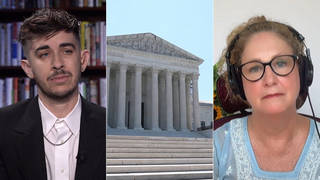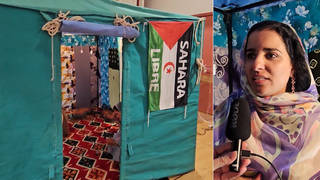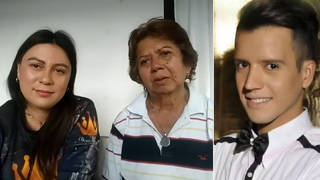
As leaders of the world’s richest nations gathered in Pittsburgh for the G-20 summit, thousands took to the streets in protest amidst a heavy police crackdown. Heavily armed riot police were out in force and used tear gas, stun grenades, smoke canisters and sound cannons, which direct extremely loud shrill sounds. Democracy Now! producer Steve Martinez files a report from the streets of Pittsburgh. [includes rush transcript]
Transcript
ANJALI KAMAT: As leaders of the world’s richest nations gathered in Pittsburgh for the G-20 summit this past Thursday and Friday, thousands took to the streets in protest amidst a heavy police crackdown. Heavily armed riot police were out in force and used tear gas, stun grenades, smoke canisters and sound cannons, which direct extremely loud shrill sounds. It was believed to be the first time sound cannons have been publicly used in the United States. More than 175 people were arrested over two days.
Democracy Now! producer Steve Martinez was in the streets of Pittsburgh to cover the story. He filed this report.
STEVE MARTINEZ: Activists from around the country gathered in Arsenal Park in order to protest the G-20 summit. This is protest organizer Albert Petrarca.
ALBERT PETRARCA: We had to go to federal court last week just to get the bare minimum of permits needed to pull this off. So the whole thing has been a conscious strategy on the part of the government, from Mayor Ravenstahl all the way up to the West Wing, to try to tamp down the turnout, because the last thing that Obama needs right now is for there to be protests from his left, from his base.
REVEREND BILLY: Some of us will go to jail today! We will take care of you! We will be there when you get out! Some of us may lose our lives today! We will respect you! You will be our heroes!
PROTESTERS: Tell me what democracy looks like!
PROTESTERS: This is what democracy looks like!
PROTESTERS: Tell me what democracy looks like!
PROTESTERS: This is what democracy looks like!
PROTESTERS: Tell me what democracy looks like!
PROTESTERS: This is what democracy looks like!
PROTESTERS: Tell me what democracy looks like!
PROTESTERS: This is what democracy looks like!
STEVE MARTINEZ: With helicopter surveillance, the authorities were able to track the demonstrators’ movements and were able to block all exits to the park, forcing demonstrators to jump an embankment in order to begin their protest.
POLICE ANNOUNCEMENT: I hereby declare this to be an unlawful assembly. I order all those assembled to immediately disperse.
PROTESTERS: The people, united, will never be defeated! The people, united, will never be defeated! The people, united, will never be defeated! The people, united, will never be defeated!
STEVE MARTINEZ: We’ve been tear-gassed. We’ve just been gassed. Actually, no violence at this point, except on the part of the police. It’s like a total burning of the nose and the eyes, the mouth.
ALBERT PETRARCA: The demonstration was orderly, disciplined, peaceful, and we got to corner of 37th and Butler Street, and the police just decided to unload tear gas.
POLICE ANNOUNCEMENT: If you do not disperse, you may be arrested and/or subject to other police action. Other police action may include actual physical removal, the use of riot control agents and/or less lethal munitions, which could cause risk of injury to those who remain.
STEVE MARTINEZ: In an act of civil disobedience, protest organizer Albert Petrarca sat and blocked a law enforcement vehicle and was promptly arrested. Then the police turned on their new weapon of crowd dispersement, the sound cannon.
In all, more than twenty-five people were arrested, including at least one National Lawyer Guild legal observer. Overnight clashes between police and protesters intensified, resulting in numerous arrests and property damage to local businesses. The overwhelming presence of law enforcement officials prompted antiwar activist Cindy Sheehan to blog, quote, “This is what a police state looks like.”
On Friday, an uneasy calm returned to the streets of Pittsburgh as thousands gathered for the Peoples’ March, a cross-section of social justice activists, human rights groups, peace groups and representatives from organized labor.
JON DELANO: What’s your response to those who are demonstrating and those who oppose this summit?
PRESIDENT BARACK OBAMA: I fundamentally disagree with their view that the free market is the source of all ills. Ironically, if they had been paying attention to what was taking place inside the summit itself, what they would have heard was a strong recognition from the most diverse collection of leaders in history that it is important to make sure that the market is working for ordinary people.
STEVE MARTINEZ: And although President Obama chose to characterize the demonstrators as rabble-rousing anti-capitalists disinterested in the actual goings-on of the summit, most who attended the rallies on Thursday and Friday felt they were getting the G-20’s message loud and clear and had their own take on the gathering of world leaders. This is musician and activist David Rovics.
DAVID ROVICS: The G-20 is — generally represents very wealthy countries that don’t have the interests of the people at heart.
REVEREND BILLY: These twenty prime ministers and presidents, they’re not operating on earth time!
PROTESTER: What time do they operate on?
REVEREND BILLY: They’re operating according to a kind of corporate gradualism! Their metabolism comes from their military advisers, big energy! They will do things very slowly! They will try to accommodate their investors! As far as I’m concerned, they’re accommodating the devil! Let’s cast out those devils!
STEVE MARTINEZ: From Pittsburgh, Steve Martinez, Democracy Now!
AMY GOODMAN: And you are watching and listening to Democracy Now!, democracynow.org, as we turn to a woman the New York Times calls India’s most impassioned critic of globalization and American influence, Arundhati Roy, world-renowned Indian author and global justice activist. Her first novel, The God of Small Things, won the Booker Prize in 1997. She has a new book; it’s called Field Notes on Democracy: Listening to Grasshoppers. An adapted introduction to the book is posted at tomdispatch.com, called “What Have We Done to Democracy?” Arundhati Roy joins us now from New Delhi, India, on the country’s biggest national holiday of the year.
Arundhati, we welcome you to Democracy Now! And as you listen to this report from the streets of G-20 by our producer Steve Martinez, talk about globalization and what has happened to democracy.
ARUNDHATI ROY: Well, that’s a huge subject, Amy. And I think my book — in my book, I discuss it in some detail in terms of what’s happening to India. But as we know now, because of the way the global economy is linked, countries are not — you know, the political systems in countries are also linked, so democracies are linked to dictatorships and military occupations and so on. We know that. We now that some of the main military occupations in the world today are actually administered by democracies: Palestine, Iraq, Afghanistan, Kashmir.
But what I think is beginning to be very clear now is that we see now that democracy is sort of fused to the free market, or to the idea of the free market. And so, its imagination has been limited to the idea of profit. And democracy, a few years ago, maybe, you know, even twenty-five years ago, was something that, let’s say, a country like America feared, which was why democracies were being toppled all over the place, like in Chile and so on. But now wars are being waged to restore — to place democracy, because democracy serves the free market, and each of the institutions in democracy, like you look at India, you know, whether it’s the Supreme — whether it’s the courts or whether it’s the media or whether it’s all the other institutions of democracy, they’ve been sort of hollowed out, and just their shells have been replaced, and we play out this charade. And it’s much more complicated for people to understand what’s going on, because there’s so much shadow play.
But really we are facing a crisis. And that’s what I ask. You know, is there life after democracy? And what kind of life will it be? Because democracy has been hollowed out and made meaningless. And when I say “democracy,” I’m not talking about the ideal. You know, I’m not saying that countries that live in dictatorships and under military occupation should not fight for democracy, because the early years of democracy are important and heady. And then we see a strange metastasis taking over.
AMY GOODMAN: We’re talking to Arundhati Roy. She’s joining us from New Delhi, India, the world-renowned author, global justice activist. Her book The God of Small Things won the Booker Prize, well known all over the world. Now she has written a new book. Today we will talk about it for the first time in the United States in a national broadcast, Field Notes on Democracy: Listening to Grasshoppers. We’ll be back with her for the rest of the hour in a minute.













Media Options